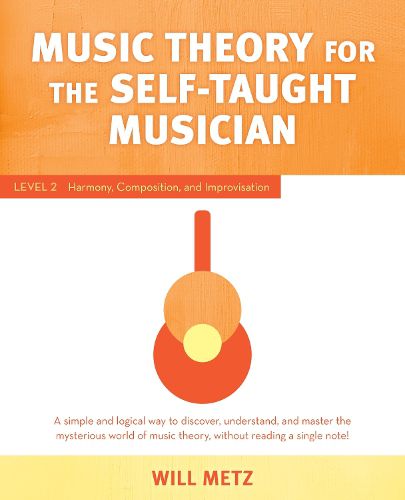Readings Newsletter
Become a Readings Member to make your shopping experience even easier.
Sign in or sign up for free!
You’re not far away from qualifying for FREE standard shipping within Australia
You’ve qualified for FREE standard shipping within Australia
The cart is loading…






Will Metz’s main ambition in his first book, Music Theory for Self-Taught Musicians: Level 1: The Basics, was to define and introduce all the main concepts used in music theory (intervals, chords, scales, modes, etc.). He refers to these notions as tools because they are what musicians use to create music. Having a clear understanding of these notions is crucial, but it is only the first step … One must then understand how to actually use these tools and how they are combined and how they interact. More concretely, this book, Music Theory for Self-Taught Musicians: Level 2: Harmony, Composition, and Improvisation goes in depth into the notions of harmony, composition, and improvisation. It answers one of the most common and troubling questions of any musician, that is: What to play in any given musical context?
This is what music theory is all about at the end of the day-learning a bunch of relatively complex notions would make no sense if they didn’t help to compose and create music. This is not rocket science, and anyone can understand the mechanisms of harmony.
All of this is explained using the same principles that are in the first book, which means no (or very few) notes written on staff and clear, logical step-by-step explanations. As a self-taught musician, Metz would have given anything to have this book when he decided to start learning harmony and was dabbling with improvisation. Allow him to save you years of time and trial and error and to finally give you the clear and complete understanding of theory you deserve.
$9.00 standard shipping within Australia
FREE standard shipping within Australia for orders over $100.00
Express & International shipping calculated at checkout
Will Metz’s main ambition in his first book, Music Theory for Self-Taught Musicians: Level 1: The Basics, was to define and introduce all the main concepts used in music theory (intervals, chords, scales, modes, etc.). He refers to these notions as tools because they are what musicians use to create music. Having a clear understanding of these notions is crucial, but it is only the first step … One must then understand how to actually use these tools and how they are combined and how they interact. More concretely, this book, Music Theory for Self-Taught Musicians: Level 2: Harmony, Composition, and Improvisation goes in depth into the notions of harmony, composition, and improvisation. It answers one of the most common and troubling questions of any musician, that is: What to play in any given musical context?
This is what music theory is all about at the end of the day-learning a bunch of relatively complex notions would make no sense if they didn’t help to compose and create music. This is not rocket science, and anyone can understand the mechanisms of harmony.
All of this is explained using the same principles that are in the first book, which means no (or very few) notes written on staff and clear, logical step-by-step explanations. As a self-taught musician, Metz would have given anything to have this book when he decided to start learning harmony and was dabbling with improvisation. Allow him to save you years of time and trial and error and to finally give you the clear and complete understanding of theory you deserve.